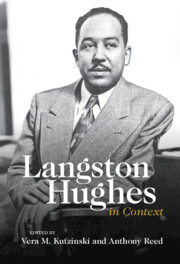Book contents
- Langston Hughes in Context
- Langston Hughes in Context
- Copyright page
- Contents
- Contributors
- Abbreviations
- Introduction
- Part I Singing America
- Chapter 1 Langston Hughes, Chicago, and Modernism
- Chapter 2 Jazz, Performance, and Modernist Embodiment in Langston Hughes’s Early Writing
- Chapter 3 His Ways with White Folks
- Chapter 4 Love at a Distance in Selected Letters by Langston and Carrie Hughes
- Chapter 5 Langston Hughes’s 1930s Short Fiction
- Chapter 6 Langston Hughes and Simple
- Chapter 7 Langston Hughes’s Famous Books, Ebony Magazine, and the Politics of Civil Rights in Biographies for the Young
- Chapter 8 Rural Black Masculinity and the Blues in Not without Laughter
- Chapter 9 From the Sublime to the Grotesque
- Chapter 10 Coalitional Aesthetics
- Chapter 11 Langston Hughes’s Translingual Poetics and Pedagogy
- Part II The Global Langston Hughes
- Part III Afterlives
- Index
Chapter 6 - Langston Hughes and Simple
Across Form and Space to a Political Consciousness
from Part I - Singing America
Published online by Cambridge University Press: 10 November 2022
- Langston Hughes in Context
- Langston Hughes in Context
- Copyright page
- Contents
- Contributors
- Abbreviations
- Introduction
- Part I Singing America
- Chapter 1 Langston Hughes, Chicago, and Modernism
- Chapter 2 Jazz, Performance, and Modernist Embodiment in Langston Hughes’s Early Writing
- Chapter 3 His Ways with White Folks
- Chapter 4 Love at a Distance in Selected Letters by Langston and Carrie Hughes
- Chapter 5 Langston Hughes’s 1930s Short Fiction
- Chapter 6 Langston Hughes and Simple
- Chapter 7 Langston Hughes’s Famous Books, Ebony Magazine, and the Politics of Civil Rights in Biographies for the Young
- Chapter 8 Rural Black Masculinity and the Blues in Not without Laughter
- Chapter 9 From the Sublime to the Grotesque
- Chapter 10 Coalitional Aesthetics
- Chapter 11 Langston Hughes’s Translingual Poetics and Pedagogy
- Part II The Global Langston Hughes
- Part III Afterlives
- Index
Summary
This chapter discusses how an unusual group of works, featuring a character nicknamed Simple, help us think about the complexities of Black political consciousness. The Simple stories appeared in the Chicago Defender over the course of twenty-three years, and were also collected in The Best of Simple and other volumes. Characters therein debate race and class from the local standpoint of the neighborhood of Harlem and extending into other worlds. Hughes’s movement across literary genres (having written in so many) takes shape in these stories as a question about the porous boundary between realist and imaginative modes, when Black people are pondering the limits of freedom and mobility. And the resemblance between Simple’s main interlocutor, an intellectual narrator, and the author is an example of how Hughes sees himself as implicated. Ultimately, in formalistic and affective terms, the Simple stories advance multiplicity as central to the experience of Blackness.
- Type
- Chapter
- Information
- Langston Hughes in Context , pp. 62 - 71Publisher: Cambridge University PressPrint publication year: 2022

